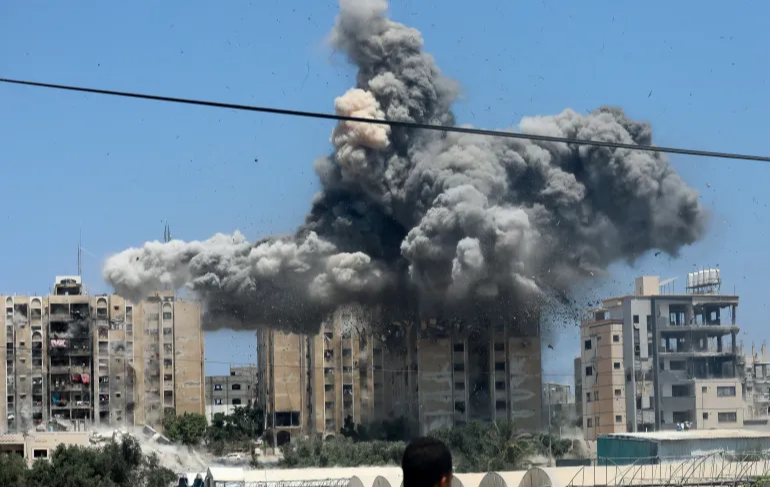
Smoke rises from an Israeli air strike on a residential building in Nuseirat in the central Gaza Strip [File: Omar Naaman/Reuters]
Cairo, August 25 (RHC)-- Hamas has rejected new Israeli conditions put forward in Gaza ceasefire talks in the Egyptian capital, Cairo, casting further doubt on the chances of a breakthrough in the latest United States-backed effort to end the 10-month-old war.
A Hamas delegation left Cairo on Sunday after meeting with mediators and receiving an update on the latest round of negotiations. Two Egyptian security sources told the Reuters news agency that the talks had ended without an agreement with neither Hamas nor Israel agreeing to compromises proposed by mediators.
Key sticking points in the talks mediated by the United States, Egypt and Qatar include an Israeli presence in the Philadelphi Corridor, a narrow 14.5 km-long (9-mile-long) stretch of land along Gaza’s southern border with Egypt.
In Cairo, Hamas’s delegation demanded that Israel be bound by what was agreed upon on July 2nd, in accordance with a plan laid out by U.S. President Joe Biden and a UN Security Council resolution.
While the group confirmed its readiness to implement that deal to achieve the interests of the Palestinian people and stop the destruction of the Gaza Strip, it stressed the need for any agreement to include a permanent ceasefire and a complete Israeli withdrawal from Gaza.
Hamas also said any agreement should include the freedom of return for Gaza residents to their homes, relief and reconstruction, and a captive-prisoner exchange deal.
Meanwhile, the Israeli Broadcasting Authority quoted officials as saying there is a very small chance that the Cairo talks would lead to progress in the swap negotiations.
The Palestinian group blames Israel and Prime Minister Benjamin Netanyahu for the lack of progress during the talks. Netanyahu is accused of imposing new demands and not being serious about reaching a ceasefire.
Netanyahu has insisted that the war in Gaza will continue until a total victory against Hamas has been won, even if a deal is reached. That objective has been rejected by many top Israeli officials, including his own defense minister, and family members of captives have accused Netanyahu of abandoning their loved ones in Gaza.
Months of on-off talks have failed to produce an agreement to end Israel’s devastating military campaign in Gaza or free the remaining captives seized by Hamas in the group’s October 7th attacks on Israel.
Continuing the war, in which Israel has killed more than 40,000 Palestinians, will worsen the plight of Gaza’s 2.3 million people, nearly all of them homeless in tents or shelters among the ruins, with malnutrition rampant and disease spreading, and risk the lives of the remaining Israeli captives.
UN peace envoy Tor Wennesland said in a social media post: “There is no time to lose.”
“Ongoing ceasefire/hostage release talks in Cairo are crucial to saving civilian lives, reducing regional tensions and enabling the UN, in cooperation with the PA [Palestinian Authority], to accelerate efforts to address the pressing needs of Gaza’s long-suffering population,” he said.
Meanwhile, U.S. Army General CQ Brown, chairman of the Joint Chiefs of Staff, began an unannounced visit to the Middle East over the weekend to discuss ways to avoid any new escalation in tensions that could spiral into a broader conflict as the region braces for a threatened Iranian attack against Israel.
On Sunday, Israel and Hezbollah engaged in a heavy exchange of fire as part of a response by the Lebanese group to the Israeli assassination of its senior commander Fuad Shukr last month in a Beirut suburb.
Hezbollah has said it would halt its attacks along the border if there is a ceasefire in Gaza. Fighting between Israel and Hezbollah since October 8th has ramped up recently, including Israeli strikes across southern Lebanon and into the Bekaa Valley and more Hezbollah rocket fire into northern Israel.

